Johnny Hiro
Right from the start here I'm going to spoil something about this book, but nothing really plot-related (because Johnny Hiro is only lightly concerned with its story ends, even to tell you flatout how Fred Chao resolves his narrative tensions wouldn't spoil this book in the least). It's also something that happens almost right at the beginning of the second chapter—so not some late-game revelation that turns the book on its head. It's something small. A moment, nothing more.
I'm usually pretty intentional about not talking about a book's plot points. Most times I won't even give a synopsis, instead electing to describe each book's qualities or failures—and most importantly, perhaps, how I felt about a book. That I'm going to now describe a page (really, a panel) should illustrate just how important that page was to my experience of the book.
Johnny Hiro's been in print for a while now, collected in 2009 by AdHouse and presently published via Tor. I would have completely missed the book had David Hopkins (Hideous Energy/Super Cute/probably other stuff) not highly recommended the book to me. He pushes Johnny Hiro maybe like I push Duncan the Wonder Dog. And of course, when first handling someone else's love, I was nervous. What if it was bad? What if I found it distasteful? What if it was not bad and completely inoffensive yet just didn't click for me? This last was my real concern after finishing the first chapter.
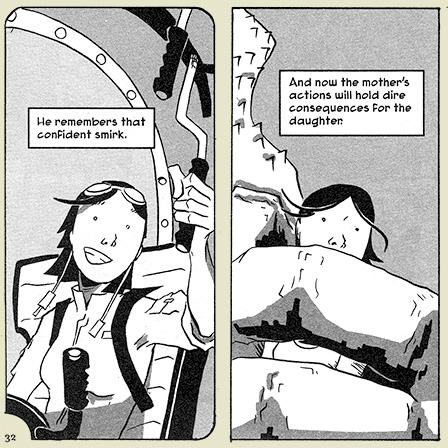
Chapter one of Johnny Hiro is fun. Amusing. Witty. Droll. It's got a sense of humour that's a bit too rare in comics. I enjoyed my time reading it, but if all this book had to offer was comedy (as nice as that can be), I would have likely soon forgotten it. Disposable calories et cetera. There were a couple nice flourishes in that first chapter, but nothing that would help me remember Johnny Hiro a year from now. It was in chapter two that I would encounter that thing that clued me in to the fact that this was a special book, one that I'd continue to value even years later.
Chapter one establishes titular Johnny as a hard-striving-though-unlucky-young man trying to live his life in New York alongside his chirpy, peppy ESL girlfriend Mayumi.11Actually, Mayumi's interesting speech patterns may not be related to her immigrant status, as a flashback shows her Japanese mother in Japan (and presumably speaking Japanese to her Japanese teammates) speaking in similarly clipped forms. So then, a family trait? They make a cute couple and we watch as Johnny spends much of the chapter trying (heroically) to rescue Mayumi from a Godzilla analogue. Much mayhem later, things have returned to status quo save for that now their rented apartment is missing a wall. Johnny is world-weary and Mayumi is optimistic. And I mean optimistic. Relentlessly optimistic. She reacts to everything in the most cheerful manner. You'd think she was dumb, but everything really kind of does seem to work out according to her expectations. I was well prepared for her to be a cardboard bag of rainbows. Chao puts work into the first chapter to make her seem so. And then, chapter two.
After a long day of work, Mayumi comes home to the new apartment they're borrowing from a friend. Johnny, after a few beats of relaxing with Mayumi in his arms, reluctantly leaves for his own work, a night shift at a sushi bar. Mayumi cheerfully sends him on his way and her buoyancy is contagious enough that Johnny struts off to his labours whistling. We flip the page and see Mayumi in her solitude. A sigh and then a staid observation of their condition:
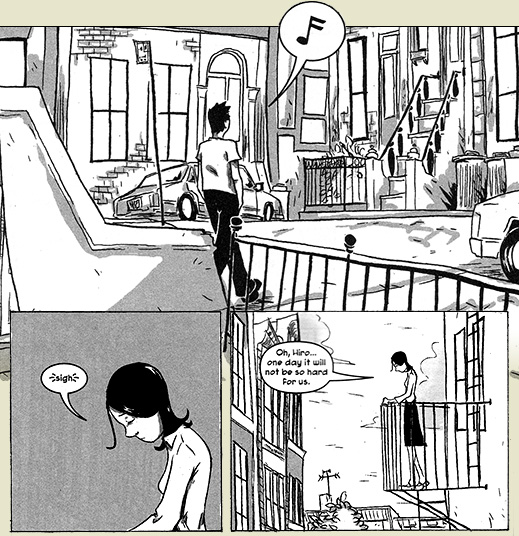 I've actually conflated the tail of one page with the first panels of the next to show context
I've actually conflated the tail of one page with the first panels of the next to show context
It was a small moment, but it stopped me. With just two panels of wholly non-dramatic storytelling, Chao 180'd the filter through which I viewed Johnny Hiro. From that moment onward, I was seeing through all the humour (and there's a lot of that) that forms the book's skin and into the meat that lay beneath. I was charmed. I was on board. I was grateful that Hopkins had made his recommendation. I knew that even if I didn't end up cherishing the book as he did, I was still fortunate to be reading it.
And, as if to prove my fortune, Johnny Hiro got even better.
Chao does this thing that is kind of genius and kind of amazing and kind of not really in the realm of what I was expecting at all. He uses a narrator whose words seem to pour forth an entirely different story from what's unfolding on panel. Through art and dialogue, the life of Johnny Hiro (half-Asian, all-hero hero of Johnny Hiro) is a hyperbolic absurdity. It's a frenetic mess of impossibilities. It's raucous and unpredictable and is marked by giant monsters, samurai wannabes, violent fishmongers, a fistful or two of celebrity cameos, and the regulars of Night Court. It's completely bizarre and played for well-earned laughs.
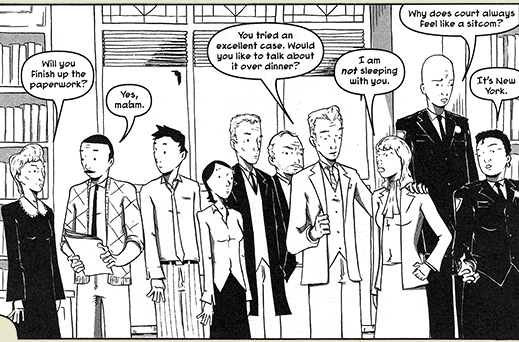 See? It's Judge Judy (not from Night Court), court clerk Mac, protagonists Johnny and Mayumi, Mayor Blumberg, a guy, prosecutor Dan and defender Christine, and bailiffs Bull and Roz.
See? It's Judge Judy (not from Night Court), court clerk Mac, protagonists Johnny and Mayumi, Mayor Blumberg, a guy, prosecutor Dan and defender Christine, and bailiffs Bull and Roz.
But layered atop the frivolity is this philosophical voice of calmed and cooled analysis, someone who knows where things are going and where they could have gone. This voice understands the fragility of Johnny and Mayumi's life in the city. This voice can reflect on the ultimate meaning to Johnny's theft of a lobster on behalf of his employer. This voice sometimes sings concert with Johnny's own inner monologue but usually maintains its leveled, appraising solo to no tune but its own.
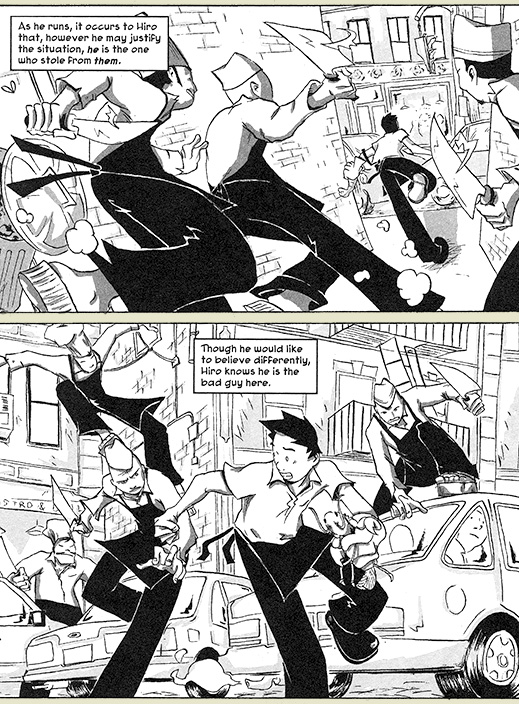
It's in the juxtaposition of these two interweaving stories—the foundational action and dialogue and the ethereal musings of the Unseen—that Johnny Hiro becomes something spectacular. Chao's use of narrator lends gravitas to Johnny's struggles, but the wit and humour with which his struggles play out breathes a lively life into what might otherwise be rather depressing. It's not often a work can be safely, legitimately described as both poignant and really funny. Johnny Hiro is such a work. And the rumour that Chao may produce more episodes to Johnny and Mayumi's story fires the anticipatory cylinders that reside in my chest, just to the right of my heart. My right, not yours. Unless you're cuddling me from behind. Then we're in perfect agreement.
In any case, there is no reason why each and every one of you reading this shouldn't seek to obtain your own copy of Johnny Hiro. I find the economics of production distressing and distasteful, but I have to imagine that if somehow every printed copy of this book were to be purchased and praised, then sheer demand alone would prompt Chao to give us more. Maybe to satisfy his own creative soul or maybe to reward our ardor for his creation. In the end, does it matter which? Because only the ends can ever justify the means.
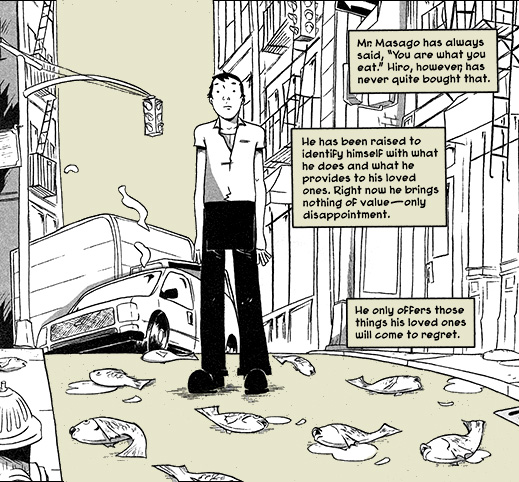
Good Ok Bad features reviews of comics, graphic novels, manga, et cetera using a rare and auspicious three-star rating system. Point systems are notoriously fiddly, so here it's been pared down to three simple possibilities:
3 Stars = Good
2 Stars = Ok
1 Star = Bad
I am Seth T. Hahne and these are my reviews.
Browse Reviews By
Other Features
- Best Books of the Year:
- Top 50 of 2024
- Top 50 of 2023
- Top 100 of 2020-22
- Top 75 of 2019
- Top 50 of 2018
- Top 75 of 2017
- Top 75 of 2016
- Top 75 of 2015
- Top 75 of 2014
- Top 35 of 2013
- Top 25 of 2012
- Top 10 of 2011
- Popular Sections:
- All-Time Top 500
- All the Boardgames I've Played
- All the Anime Series I've Seen
- All the Animated Films I've Seen
- Top 75 by Female Creators
- Kids Recommendations
- What I Read: A Reading Log
- Other Features:
- Bookclub Study Guides










